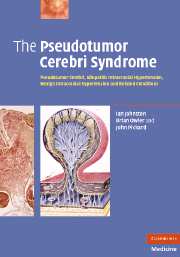 The Pseudotumor Cerebri Syndrome
The Pseudotumor Cerebri Syndrome Book contents
5 - Aetiology
Published online by Cambridge University Press: 21 August 2009
Summary
Introduction
Several obstacles stand in the way of any attempt at a definitive analysis of the aetiology of PTCS. First, there is the issue of definition. If the concept of a condition properly called idiopathic intracranial hypertension (IIH) and the application of the so-called Dandy criteria are both rigidly adhered to, then any discussion of aetiology is necessarily going to be speculative and short. If, on the other hand, the broader concept of PTCS is accepted, the matter of aetiology becomes one of considerable importance, as well as being one of considerable complexity. It is this latter concept which is advanced in the present work, and is, moreover, de facto accepted in most of the literature on the subject, whatever actual term is used for the condition. In the first accounts of the syndrome a number of putative aetiological agents were identified and this number has been progressively added to over subsequent years. It is worth noting that the majority of the early recognized factors – for example, cranial venous outflow compromise, haematological disorders, non-specific infections, endocrine disturbances and minor head injury – have retained a place in the ever-growing list of possible aetiological factors.
The secure identification of an aetiological agent in a particular case demands both careful history-taking and detailed investigation. The latter particularly is often lacking in reported cases, especially in relation to possible cranial venous outflow abnormalities, and also the haematological abnormalities which might underlie such problems.
- Type
- Chapter
- Information
- The Pseudotumor Cerebri SyndromePseudotumor Cerebri, Idiopathic Intracranial Hypertension, Benign Intracranial Hypertension and Related Conditions, pp. 82 - 126Publisher: Cambridge University PressPrint publication year: 2007


